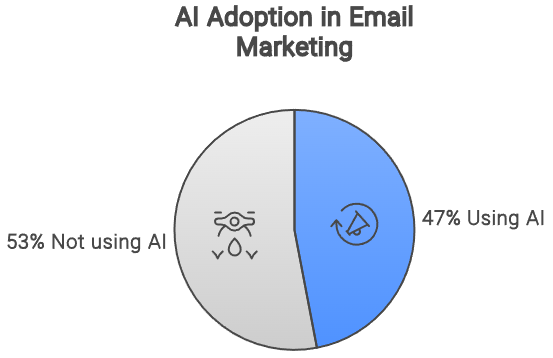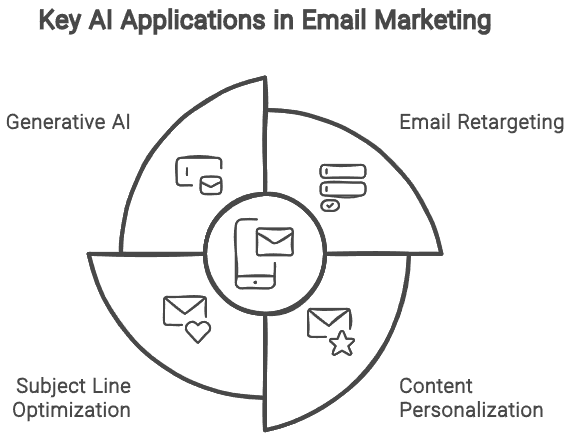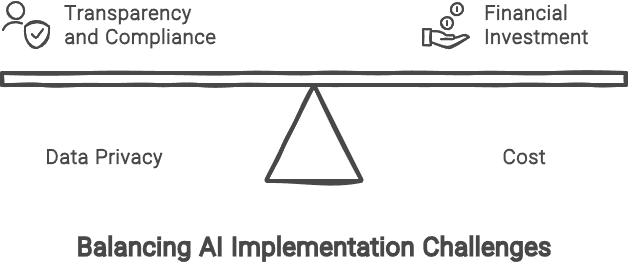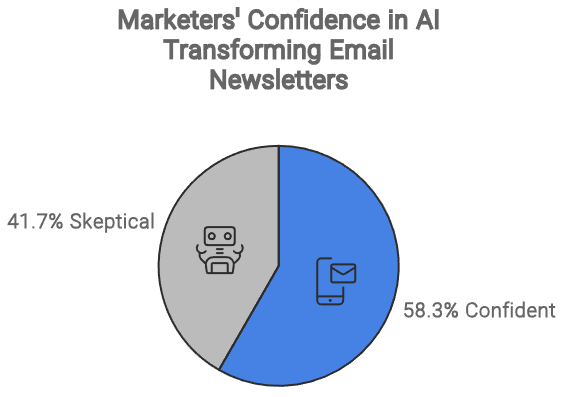Email marketing in 2024 is about creating meaningful connections with your audience in an increasingly complex digital landscape. Gone are the days when blasting out generic emails to a massive list was enough to get the job done. Today, customers expect more. They want messages that speak directly to their needs and interests, and they expect those messages to arrive at precisely the right moment.
This is where AI steps in. Not as a futuristic gadget but as a practical tool that's reshaping how us marketers think about and execute their campaigns. Ready? Let's do a solid deep dive.
The Shift from Traditional to AI-Driven Email Marketing
The truth is, email marketing has always been a bit of a balancing act.
On the one hand, you need to capture attention in a crowded inbox, and on the other, you must deliver value that justifies a click-through or a conversion. Traditional methods often fell short, leaving marketers frustrated with low engagement and high churn rates. But with the advent of AI, the rules of the game are changing. AI isn’t just automating tasks; it’s bringing a level of sophistication to email marketing that was previously unimaginable.

AI Adoption and Usage in Email Marketing
To understand the impact of AI, we first need to look at how it's being adopted across the industry.
Interestingly, 47% of email marketers are already using AI in some form. That's nearly half! And of course, this isn’t just a passing trend but a clear signal that AI is becoming an integral part of email marketing strategies. What’s more striking is the leap in adoption among B2B marketers at larger companies. For those in organizations with over 500 employees, AI usage has also skyrocketed, jumping from 26% last year to 57% today. This isn’t just about keeping up with the competition, but it’s about staying relevant in a world where consumer expectations are constantly evolving.

Practical Applications of AI in Email Campaigns
The ways in which AI is being used in email marketing are as varied as they are powerful. One of the most common applications is email retargeting, where AI helps marketers reconnect with potential customers who have shown interest but haven’t yet converted. It’s a smart way to keep your brand top-of-mind without being intrusive. Then there’s content personalization, another area where AI really shines. Imagine receiving an email that feels like it was written just for you, with content that resonates on a personal level. This isn’t a happy accident, but the result of AI analyzing user data to craft messages that align perfectly with individual preferences. And let’s not forget about the humble subject line, which can make or break your email campaign. AI is now optimizing subject lines in ways that were previously left to guesswork or endless A/B testing. By analyzing past performance and user behavior, AI can suggest subject lines that are not only catchy but also more likely to drive opens and clicks. And then there's the magic of generative AI, which 95% of marketers find beneficial for creating compelling email content. Over half of them—54% to be exact—rate it as "very effective." The days of writer’s block might just be numbered.

Impact on Revenue and Engagement
All these advancements aren’t just about making emails prettier or more personalized; they’re also about driving real business outcomes. Consider the impact on revenue. AI-driven strategies like automated abandoned cart emails have been shown to generate a staggering 320% more revenue than their non-automated counterparts. This isn’t just incremental improvement—it’s a game-changer. Personalized emails, which leverage AI to tailor content to individual recipients, can increase revenue by up to 760%. Numbers like these make it clear that AI isn’t just a nice-to-have; it’s a must-have for any serious marketer looking to maximize ROI. AI is also enhancing engagement across the board. Personalized content, often powered by AI, leads to a 26% higher open rate. When you consider that automated emails have a 73% open rate compared to 29% for regular emails, it becomes obvious that AI is transforming not just how we communicate, but how well we do it. The result is a more engaged audience that’s more likely to convert, which, after all, is the ultimate goal of any marketing effort.

Challenges and Considerations
But as with any powerful tool, AI comes with its own set of challenges and considerations. Data privacy is one of the most pressing issues, especially in a world where regulations like GDPR are becoming the norm rather than the exception. Marketers need to be transparent about how they use AI and ensure they’re compliant with all relevant laws. Ethical concerns also arise when we think about the potential for AI to be used in ways that might feel invasive or manipulative. Striking the right balance between personalization and privacy will be key to maintaining trust with your audience. Another potential pitfall is the temptation to over-rely on AI. While AI can do a lot, it’s not a replacement for human creativity or judgment. There’s still a need for the human touch in crafting messages that resonate on an emotional level. AI can help guide the process, but it can’t replace the nuanced understanding that a skilled marketer brings to the table. Cost is another factor to consider. Implementing AI solutions can be expensive, especially for smaller businesses. However, the potential returns often justify the investment. For those on a tighter budget, there are ways to integrate AI gradually, starting with more affordable tools and scaling up as you see results. The key is to approach AI not as a silver bullet, but as a tool that, when used wisely, can significantly enhance your existing strategies.

AI’s Expanding Role in Email Marketing
Looking ahead, the role of AI in email marketing is only set to grow. More and more marketers are increasing their budgets for email marketing, recognizing its value over other channels like social media or influencer marketing. This increased investment is likely to drive further innovation in AI-powered tools, making them even more accessible and effective. We’re also seeing AI play a bigger role in the overall strategy, especially in enhancing email newsletters. A significant 58.3% of marketers are confident in AI’s potential to transform their newsletters into more dynamic and engaging content. Predictive analytics, which is a key feature of AI, is becoming essential for email automation. It provides insights that allow marketers to tailor their engagement strategies more precisely, predicting customer behavior and adjusting campaigns in real-time.

As AI continues to evolve, it will likely integrate even more seamlessly with other marketing channels, creating a cohesive and personalized experience for customers across platforms. Whether it’s integrating email marketing with social media, SMS, or even in-store experiences, AI will be at the forefront of creating these multi-channel strategies. As we move further into 2024, those who leverage AI wisely will find themselves leading the pack in the ever-competitive world of digital marketing.

